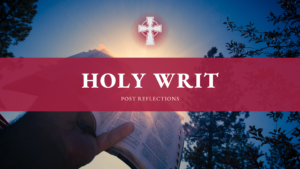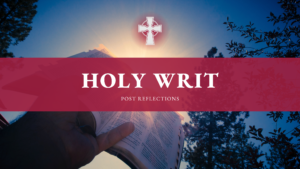
What are Ember Days?
In the Anglican Church, Ember Days are days for prayer, fasting and abstinence, and acts of penitence, embodying the contrition found in Psalm 51. The purpose of the acts, besides those mentioned, is to grow in thanksgiving unto God for the gifts of nature, learning to make use of them in moderation and assist the needy. In our liturgical calendar, these days typically land on the Wednesdays, Fridays, and Saturdays after the first Sunday in Lent, Pentecost, Holy Cross Day (Sept. 14), and St. Lucy’s Day (Dec. 13). According to the Prayer Book Dictionary, “The name is probably derived, through German, from quatour tempora, but a derivation has been proposed from Ang.-Sax. ymbren, ‘recurring.’” Despite the existence of these holy days in the church calendar, they hardly get any attention. But it is fitting in this season of Lent to observe such days set apart by the church’s wisdom.
Read: Why Do Anglicans Celebrate Feast Days?
The Ember Days in the Church
In the western church, the ember days were typically observed every week. Once this practice died out, it was maintained at the beginning of every season, often in connection with the sowing, reaping, and vintage, the winter fast being added later. Leo the Great (c. 440) refers to these holy days in Rome. While the Roman heathens praised their gods during these seasons, the Christian response was to give rightful worship to the Father, the Son, and the Holy Ghost–the One from “whom are all things and for whom we exist” (1 Cor. 8:6). The practice was brought to England by St. Augustine of Canterbury.
Reflecting and in support of this liturgical practice, in 813 AD, the Council of Mainz ordered a fast on Wednesdays, Fridays, and Saturdays of the first week of March, the second week in June, the third week in September, and the last full week before Christmas. Having spread throughout the West, they were established as fasts of the seasons, leading them to be considered suitable for Ordinations. There are even special Collects for those to be ordained and appointed for the whole of the Ember weeks.
Is observance of Ember Days necessary? How should Ember Days be observed?
For the postulant or candidate for holy orders in the Reformed Episcopal Church, the observance of Ember Days is required to report to the bishop during the Ember Weeks, informing them of their academic, personal, and spiritual development.
For everyone else, observance of the Ember Days is not necessary. However, when is it a bad idea for Christians to offer collective thanks unto God through prayer and fasting? Though there are no specific rules, the encouragement is clear: Set apart the Ember Days unto God.
This is not for God’s benefit but for the benefit of his people.
Some suggestions on how to observe Ember Days:
- Recommit to Morning and Evening Prayer.
- Add Prayers at Mid-day and/or Compline.
- Fast from breakfast, lunch, or dinner.
- Fast from meat, sugar, or any comfort foods that typically have a hold on you.
- Abstain from entertainment binges and idleness.
- Make time for your family.
- Take your priest out for lunch (unless he’s fasting) and pray for him.
Collect for Ember Day, A Reflection
A great prayer to pray on Ember Days is the following Collect, found in the 1928 Prayer Book:
O ALMIGHTY God, who hast committed to the hands of men the ministry of reconciliation; We humbly beseech thee, by the inspiration of thy Holy Spirit, to put it into the hearts of many to offer themselves for this ministry; that thereby mankind may be drawn to thy blessed kingdom; through Jesus Christ our Lord. Amen.
There are a couple of things worth meditating on that are included in this prayer: (1) the ministry of reconciliation and (2) the Holy Spirit putting this ministry into the hearts of many.
Ministry of Reconciliation
First, God has committed to men the “ministry of reconciliation.”
In short, it is the ministry of the Gospel. St. Paul declares this ministry in 2 Cor. 5:17-21:
17Therefore, if anyone is in Christ, he is a new creation; old things have passed away; behold, all things have become new. 18Now all things are of God, who has reconciled us to Himself through Jesus Christ, and has given us the ministry of reconciliation, 19that is, that God was in Christ reconciling the world to Himself, not imputing their trespasses to them, and has committed to us the word of reconciliation. 20Now then, we are ambassadors for Christ, as though God were pleading through us: we implore you on Christ’s behalf, be reconciled to God. 21For He made Him who knew no sin to be sin for us, that we might become the righteousness of God in Him.
God sent his Son to the world to redeem sinful man. Because Christ lived a perfect life, died, and rose again, those who cling to him are transformed into new people, ridding themselves of their sinful lifestyles and proclivities by the power of the Holy Ghost. Because Christ offered Himself for us, we are now reconciled to God the Father.
Now, we can find our comfort in the Father’s words to Christ when He was baptized as if they were for us: “this is my Son, whom I love; with him I am well pleased” (Matt. 3:17).
As Paul says, “we are ambassadors for Christ.” We proclaim the message of reconciliation to all people as official members of His household. Since Christ has regained dominion over all the earth, we go out heralding a welcome invitation into the kingdom of heaven, telling all people to repent and be baptized. As ambassadors, we will win back the culture, not with the authority we have in ourselves, but with the authority given to us by Christ Himself.
As He has said, “All authority has been given to Me in heaven and on earth.”
Ministry Starts in the Heart
Second, we ask God to put it into the “hearts of many to offer themselves for this ministry.” As Anglicans, we acknowledge that God is the primary actor in salvation. Further, we would want to acknowledge that he picks out and inspires those amongst his flock who would become leaders, priests, deacons, bishops, evangelists, missionaries, etc.
The work of ministry begins in the heart, so it is this we ask of God.
May this remind us to use this time of Embertide to look inwardly and to assess our hearts. Do we have a desire to speak to strangers, our co-workers, our family, and even our own souls about the Gospel? Do we desire to be in prayer? Do we desire God’s comforts, or the world’s?
May we ask the Lord to rekindle a newfound, godly desire in our hearts.
The fasts, abstinences, and practices of the Embertide are not rote or purposeless. We eliminate things that are unnecessary in our life to make room for the things that matter. We eliminate our morning coffee to pray through a psalm or two. We throw our television in our garage for a season so that our family time may not be obstructed by vain entertainment. We sacrifice in order to reap the fruits of eternal life; not only for ourselves but for those around us as well.
How do our hearts respond to the possibility of withholding their earthly comforts? How should they respond?
Remember our Lord’s words: “for where your treasure is, there your heart will be also” (Matt. 6:21).
And Solomon’s wisdom: “keep your heart with all diligence, for out of it springs the issues of life” (Proverbs 4:23).
As Christians, we’re all called to the ministry of reconciliation, so may the Lord begin this good work right where He desires it to start: in our hearts.
Learn more about the beliefs of St. Andrews Reformed Episcopal Church
Listen to our sermons and connect with us here if you have any questions.
Our Mission
To multiply faithful servants of Christ; who will commit themselves to the worship and doctrines of the Anglican way, and who will work by God's grace and for His glory to disciple the nations through the ministry of the Church.








